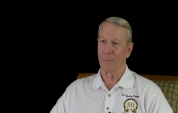2:31 | It was about the closest he came to a bad end in Vietnam. John Le Moyne had to low crawl up to a dug in machine gun position for the better part of an afternoon. Fortunately, there was a flaw in their building design.
Keywords : John Le Moyne Vietnam advisor low crawl machine gun friendly fire

College was expensive, so John Le Moyne took a year off to enlist in the Special Forces Reserve. It changed his life. When he returned to the University of Florida, he did half the studying and got twice the grades.
After just a small taste of military training, John Le Moyne wanted more. He joined ROTC and then took a regular Army commission. Next stop: Ranger School.
His first assignment was in a Davy Crockett platoon, but that field nuclear weapon system was short lived and John Le Moyne began training to be an advisor in Vietnam. When he got there, he walked out of in-processing and went looking for the unit he wanted.
The enemy was mainly NVA regulars where American advisor John Le Moyne was working with a South Vietnamese Airborne battalion. They would pour out of Cambodia every couple of weeks and attack. Some of the men with the Airborne had been fighting the Communists for twenty years.
His first day in the jungle was memorable. American advisor John Le Moyne saw his South Vietnamese paratroopers stage a daring frontal assault, called in his first air strikes and Medevacs and, after it was over, he wondered if every day was going to be like this.
Six months after John Le Moyne had battled entire regiments of the NVA in the Tay Ninh area, there were only isolated small groups operating. The war had changed. As a new company commander, he had a lot of questions and he was fortunate to have superiors who were patient.
Advisor training gave John Le Moyne a good grounding in Vietnamese language and culture. Reading books like Street Without Joy and The Ugly American gave him an idea of what to expect as an outsider in a nation at war. Once he was there, he found out that he had been taught the language with a North Vietnamese accent.
American advisor John Le Moyne didn't give the South Vietnamese Airborne unit much advice. He was there to call in air strikes, artillery, Medevacs and resupply. He marveled at the toughness and courage of the fighters who traced the unit's lineage back to the French Colonial Airborne.
The VC were scarce. After the Tet Offensive severely reduced their numbers, the battle for John Le Moyne was with the NVA. He had access to a range of supporting fire, and when he called in air power, he preferred the A-1E Skyraider, a powerful prop plane that was more suited to close support than jet aircraft.
John Le Moyne never asked questions. The American advisor just ate the dinner his Vietnamese partners served him every night. There was no real down time for the South Vietnamese Airborne. They were always on the move. One night, the battalion XO made contact on the radio with an enemy soldier across the border in Cambodia. This led to an interesting discovery.
Vietnam was full of important lessons for John Le Moyne, who tried to pass the knowledge on throughout his career. Should we have been there? Maybe not, when you consider who was in charge at the time. At least he missed the ill treatment that many experienced when he returned.
It was lessons learned in Vietnam that John Le Moyne tried to pass on as an instructor in Ranger school. The candidates would soon have the awesome burden of being responsible for the lives of others.
John Le Moyne had come in to Saudi Arabia leading an advance team. Starting from scratch in the desert, in the summer, huge operating bases were established. The locals were amazed at the way the Americans adapted to the environment. It was during this conflict that many innovations in troop care and comfort were devised.
John Le Moyne never had a bad assignment. That's the way he looked at it, anyway, and it had a lot to do with the excellent leaders he encountered throughout his career. They helped him crack the code on how to win the trust of soldiers.
During Operation Just Cause, John Le Moyne was assigned to the Joint Special Operations Command (JSOC) as a liaison officer to other agencies. In this capacity, he was able to observe some high level command operations that were very impressive. It was only a short while after this brief conflict that Saddam Hussein began to make noise in the Middle East.